|
|
|
Sort Order |
|
|
|
Items / Page
|
|
|
|
|
|
|
| Srl | Item |
| 1 |
ID:
131147
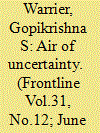

|
|
|
|
|
| Publication |
2014.
|
| Summary/Abstract |
Environment minister Prakash Javadekar will not have to worry about pressures from alliance partners. But one does not know how much space he is willing to carve out for himself and how much space the government is likely to give him.
|
|
|
|
|
|
|
|
|
|
|
|
|
|
|
|
| 2 |
ID:
130269
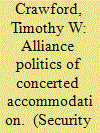

|
|
|
|
|
| Publication |
2014.
|
| Summary/Abstract |
This article examines the challenges allies face in coordinating diplomatic efforts to accommodate and peel off their main enemy's Potential Allies. It elucidates the key dimensions, and the underlying Coordination Dynamics, of this problem of "concerted accommodation," and it develops propositions about the conditions that shape the efficacy of such efforts. The argument links allies' strength to their divergent or convergent assessments of the target state's ability to tip the war toward victory or defeat. Divergent assessments foster weak allied efforts that are likely to fail, but when allies agree that the target is a potential "war-tipper," they will support their concerted accommodation policy with more robust cooperation that is more likely to work. The causal arguments and mechanisms are examined in a paired comparison analysis of two First World War cases: the Entente's efforts to induce (1) Ottoman neutrality and (2) Italian intervention.
|
|
|
|
|
|
|
|
|
|
|
|
|
|
|
|
| 3 |
ID:
128999
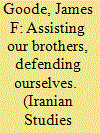

|
|
|
|
|
| Publication |
2014.
|
| Summary/Abstract |
The Iranian military intervention in Oman (1972-75) proved to be one of Shah Mohammad Reza Pahlavi's most successful foreign policy initiatives. He entered at the request of Sultan Qabus to help quell the Marxist rebellion of the Popular Front for the Liberation of Oman in Dhufar province. The shah took this action without any prior consultation with either Britain or the United States, acting for reasons wholly related to Iran's regional security. In so doing, he angered most of his Arab neighbors, who protested vigorously. He persisted. His troops tipped the balance in favor of the sultan's forces, contributing to a speedy end to the insurrection, for which Iran earned the lasting gratitude of the sultan.
|
|
|
|
|
|
|
|
|
|
|
|
|
|
|
|
| 4 |
ID:
134134
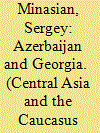

|
|
|
|
|
| Publication |
2014.
|
| Summary/Abstract |
The relations between Georgia and Azerbaijan are a key factor in regional politics and security in the Southern Caucasus. They strongly affect economic contacts and trade, as well as the implementation of all sorts of communication and energy projects. The two countries agree on many issues of regional policy, the way ethnopolitical conflicts should be settled, and the degree to which external actors could or should be involved. Turkey's presence in bilateral Georgian-Azeri relations is another important factor that may end in a geopolitical triangle of sorts in the Southern Caucasus. On the other hand, these relations cannot and should not be described as a formalized full-scale political, let alone, military-political alliance with corresponding mutual obligations. The author discusses these and other aspects of bilateral relations, assesses the prospects for further cooperation, and points to the possible challenges and problems that might crop up later.
|
|
|
|
|
|
|
|
|
|
|
|
|
|
|
|
| 5 |
ID:
133485
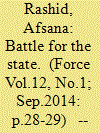

|
|
|
|
|
| Publication |
2014.
|
| Summary/Abstract |
With the State Assembly elections round the corner, mainstream political parties and separatists here are gearing up with their respective agendas. Many new political equations and alliances are expected to come to the fore in the upcoming polls, in Jammu and Kashmir, slated at the end of this year.
The contest will be close for several stalwarts and many new faces will emerge on the political horizon of the state. Though bijli, pani and sadak (electricity, water and roads) will remain the main focus of the election manifesto of several political parties, resolution of Kashmir issue, abrogation of Article 370 (that provides special status to the state of Jammu and Kashmir) and rehabilitation for Kashmiri Pandits will find equal importance on their respective agendas. Prof. Farooq Fayaz, a prominent historian, author and director Academic Staff College, University of Kashmir, observes that apart from focusing on good governance, all political parties have their own roadmaps to follow
|
|
|
|
|
|
|
|
|
|
|
|
|
|
|
|
| 6 |
ID:
128994
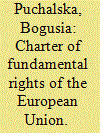

|
|
|
|
|
| Publication |
2014.
|
| Summary/Abstract |
The proclamation of the Charter for Fundamental Rights of the European Union, in December 2000 at Nice, France, followed by its inclusion within the failed Constitutional Treaty and its current status as a legally binding document under the Treaty of Lisbon, charts the changing fortunes of European Union politics dealing with fundamental rights protection. This article outlines the main rationales and hopes behind the enactment of the Charter and notes that through the process of political conditionality it may have been devalued from its very conception. The article suggests that, following their accession, Poland, and later the Czech Republic, used the Charter and Lisbon Treaty negotiations, including their opt-outs from the Charter, to engage in a game of power politics that had both domestic and European undertones. This politics of power game-play reflected a need by both states, and Poland in particular, to respond to both the political conditionality that they had been required to sign up to as part of the accession process and to emphasise how membership had improved their negotiating power. The article suggests that the consequence of this action by both states has not only further devalued the Charter but potentially undermined the rights of Polish and Czech citizens.
|
|
|
|
|
|
|
|
|
|
|
|
|
|
|
|
| 7 |
ID:
127354
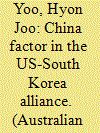

|
|
|
|
|
| Publication |
2014.
|
| Summary/Abstract |
Over the past 10 years, South Korea has chosen inconsistent strategies with respect to the US-South Korea alliance. On the one hand, Seoul disagreed with Washington about the extended role of United States Forces Korea and the deployment of US missile defence systems in East Asia. On the other hand, these problems ironically coincided with South Korea's strong support for the USA in operations in Afghanistan and Iraq. What explains the inconsistency of South Korea's alliance policies? Major schools of thought in international relations have offered explanations, but their analyses are deficient and indeterminate. This article looks at the South Korea-China-North Korea triangle as a new approach to explaining the puzzling behaviour of South Korea. The model shows that South Korea's alliance policies are driven by two causal variables. First, North Korea is an impelling force for South Korea to remain as a strong US alliance partner. This encourages Seoul to maintain cooperation with Washington in wide-ranging alliance tasks. Second, South Korea's policies are likely to reflect the way the nation perceives how useful China is in taming North Korea. The perceived usefulness of China causes Seoul to accommodate China and decrease cooperation with the USA. This might strain the relationship with the USA should South Korea evade alliance missions that might run contrary to China's security interests.
|
|
|
|
|
|
|
|
|
|
|
|
|
|
|
|
| 8 |
ID:
130285
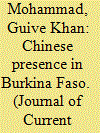

|
|
|
|
|
| Publication |
2014.
|
| Summary/Abstract |
Burkina Faso currently has no diplomatic relationship whatsoever with the People's Republic of China. Engaged in cooperation with Taiwan since 1994, it is one of only three African countries not a part of the Forum on China-Africa Cooperation. This unusual situation has produced a unique manifestation of the Chinese presence in Burkina Faso, where the estimated 600 Chinese migrants are primarily private entrepreneurs. This phenomenon of "globalization from below" - or, this migration of entrepreneurs that transcends the absence of diplomatic relations - creates new intimate social relations between the Burkinabe and Chinese people who come into contact with each other. Far from simply turning Chinese and Burkinabe into economic competitors, these relations have also led to the emergence of many forms of interpersonal and business cooperation. In this paper, I therefore demonstrate how Sino-African cooperation from below has developed in Burkina Faso, which stands in radical contrast to the latter's cooperation with Taiwan, which takes place almost exclusively on a broader state-to-state level. The empirical evidence of this study is drawn from field survey interviews and observations of both Chinese and Burkinabe entrepreneurs in Burkina Faso between 2010 and 2011.
|
|
|
|
|
|
|
|
|
|
|
|
|
|
|
|
| 9 |
ID:
134061
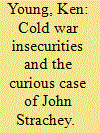

|
|
|
|
|
| Publication |
2014.
|
| Summary/Abstract |
When Socialist intellectual John Strachey was appointed as Secretary of State for War in 1950, his pre-war record as a Marxist writer with close connections to the Communist Party of Great Britain (CPGB) became a matter of public debate. A bitter campaign was run against him in the Beaverbrook press, and some members of the US defense and nuclear establishment pressed for an embargo on sensitive information being passed to the UK War Office. American suspicion of the political reliability of the Labour government was heightened by the appointment, but this does not explain how and why some Americans were so hostile to Strachey. The FBI's dossier on his pre-war activities, circulated amongst his American critics, documented Strachey's supposed secret membership of the CPGB's Central Committee. MI5 and Special Branch files show that this supposition was based on faulty intelligence. The readiness of American anti-Soviet protagonists to lend credence to such suspicions contrasts with the relaxed view of Strachey's past that was taken in Whitehall. Both positions were characteristic of their time, and of this stage in the Anglo-American alliance. This paper explores the ways in which American insecurities and a British climate of tolerance towards fellow travellers shaped the way that episode played out.
|
|
|
|
|
|
|
|
|
|
|
|
|
|
|
|
| 10 |
ID:
129670
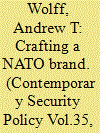

|
|
|
|
|
| Publication |
2014.
|
| Summary/Abstract |
NATO confronts four distinct public perception challenges: weak or varying public support for the alliance and its specific missions; a general lack of public awareness of the alliance's post-cold war transformation; diverging opinions on its proper role in the world; and parochial and domestic interests filtering into NATO's agenda. These various public relations challenges detract from alliance cohesiveness, impede mission performance, breed confusion and dissension about alliance aims, and raise questions about the proper operation of democratic governance within the alliance. Recent alliance communication efforts encompassing public diplomacy and strategic communications have failed to improve these public perception challenges. Instead, NATO should consider adopting a long-term branding strategy that focuses specifically on shaping the public's mental image of the alliance through the creation, promulgation, and management of a core message. Such a strategy has the potential to create a more consolidated alliance mandate that is easier for the public to understand and, ultimately, transforms the way NATO relates to its public.
|
|
|
|
|
|
|
|
|
|
|
|
|
|
|
|
| 11 |
ID:
128988
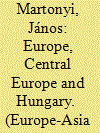

|
|
|
|
|
| Publication |
2014.
|
| Summary/Abstract |
2014 can be considered a year of anniversaries. These include five key events that have shaped the historical and contemporary face of modern Europe: 100 years since the start of the First World War; 70 years since the Holocaust; 25 years since the collapse of Communism in Central Europe; 15 years since the accession of the first Central European countries (Czech Republic, Hungary and Poland) to NATO; and, most recently, ten years since the accession of eight former communist bloc states to the European Union. 2014 offers many opportunities to reflect on how far Europe, and in particular Central Europe, has come during these years. Writing from the position of Hungary, but also acknowledging the wider Central European region, this commentary pays particular attention to the tenth anniversary of the EU's eastern enlargement and reflects on both the positive developments and the challenges for the European integration project that were raised during this time and which still lie ahead.
|
|
|
|
|
|
|
|
|
|
|
|
|
|
|
|
| 12 |
ID:
131388
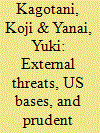

|
|
|
|
|
| Publication |
2014.
|
| Summary/Abstract |
A number of US overseas bases were deployed around the world to protect allies and maintain regional peace. Some bases have been stationed in the partner countries for the long term, whereas others were withdrawn from their partners' territories in the face of strong local opposition. Understanding local support for US overseas bases is indispensable for managing alliance politics and pursuing US grand strategy. This article addresses the 1972-2006 Okinawa gubernatorial elections where the US base issue had been chronically politicized and locals supported pro-base candidates six out of ten times contrary to their anti-base preferences. This article addresses external threats as a determinant of vote choice. We analyze the gubernatorial elections as the opportunities for Okinawans to convey their support for or opposition to the current national security policy since US bases in Okinawa are critical to Japan's security. We find that external threats do encourage Okinawans to support pro-base candidates, but the effect of perceived security-related risks is moderate. Moreover, physical and psychological costs such as airplane crashes, environmental and noise pollution, and rape incidents have larger influence on the election outcomes rather than material benefits such as the fiscal transfers and base-related subsidies, which is contrary to the conventional view.
|
|
|
|
|
|
|
|
|
|
|
|
|
|
|
|
| 13 |
ID:
128998
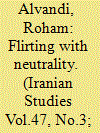

|
|
|
|
|
| Publication |
2014.
|
| Summary/Abstract |
Despite the Eisenhower administration's strong support for the Pahlavi monarchy, tensions simmered under the surface of Mohammad Reza Shah's relationship with the United States throughout the 1950s. Following the Qarani coup attempt and the overthrow of the Iraqi monarchy in 1958, the shah sought to diminish the Soviet threat to his regime and reduce his dependence on the United States by exploring Moscow's offer of a non-aggression treaty. Drawing on American, British, and Iranian sources, this article provides the first detailed history of these secret Soviet-Iranian negotiations that ended in disastrous failure for the shah in February 1959.
|
|
|
|
|
|
|
|
|
|
|
|
|
|
|
|
| 14 |
ID:
132021
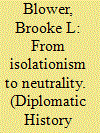

|
|
|
|
|
| Publication |
2014.
|
| Summary/Abstract |
This essay assesses the pitfalls of relying on isolationism to describe American political culture during the 1920s and 1930s and proposes that the concept of neutrality offers a more useful framework for understanding how Americans struggled with their place in a world at war. Americans had long worried about foreign entanglements, but what lent the debates after World War I their special urgency and potency was a sense that one important option in the traditional conduct of international relations-neutrality-had become unhinged from its moorings. Understanding the shifting meanings, and ultimately the perceived demise of neutrality as a viable form of statecraft, points toward a new way to narrate the turning points and political alliances of the interwar years. It also helps to explain why, since the 1930s, Americans have become more readily embroiled in military conflicts overseas despite their recurring doubts about the price of such engagement.
|
|
|
|
|
|
|
|
|
|
|
|
|
|
|
|
| 15 |
ID:
087343
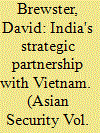

|
|
|
|
|
| Publication |
2009.
|
| Summary/Abstract |
For more than 40 years, India and Vietnam have consistently stood together in resisting Chinese domination of Indochina. The relationship represents one of the few longstanding political partnerships between East and South Asia. In recent years, the two have been seeking to recalibrate their relationship in the context not only of China's growing economic and military power but also India's own security ambitions in the region. What are India's aspirations to project naval power into the South China Sea and how is this perceived in the region? This article looks at this longstanding political alliance in light of India's attempts at strategic engagement with Southeast Asia.
|
|
|
|
|
|
|
|
|
|
|
|
|
|
|
|
| 16 |
ID:
132162
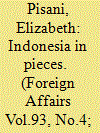

|
|
|
|
|
| Summary/Abstract |
In April, voters in Indonesia's parliamentary elections shocked many observers, confounded most pollsters, and seemed to set back their own long-term interests by failing to deliver a massive victory to the main opposition party, the Indonesian Democratic Party of Struggle. Under the country's complex electoral rules, a party must win 25 percent of the popular vote (or 20 percent of the seats in parliament) before it can formally nominate a presidential candidate. Polls had predicted that the Democratic Party of Struggle would win up to 30 percent of the vote, largely thanks to the massive popularity of the politician the party announced would represent it in the presidential election: Joko Widodo, the governor of Jakarta, who was expected to win that race handily. But his party managed to eke out only 19 percent -- more than any of the 11 other parties in the running, but not enough to cross the threshold. And so Jokowi, as he is widely known, will have to form a coalition to run for president, meaning that if he manages to take the helm of the world's third-largest democracy in July, he'll do so with little power and representing an alliance with no clear platform.
|
|
|
|
|
|
|
|
|
|
|
|
|
|
|
|
| 17 |
ID:
128984
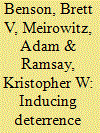

|
|
|
|
|
| Publication |
2014.
|
| Summary/Abstract |
Do military alliances foster aggressive behavior in allies to the point of undermining the security goal of the alliance? Like others, we find that alliance commitments may cause moral hazard because allies do not fully internalize the costs of actions that can lead to war. But unlike others, we show that the effect of moral hazard can improve security. Moral hazard can be the driving force behind generating deterrence and avoiding costly conflict. Aggressors may refrain from initiating crises if their target enjoys additional resources from its ally and so is more willing to fight back. So rather than incurring costs, moral hazard may be the very key to deterring potential aggressors and minimizing the risk of conflict. This behavior allows alliance partners to capture a "deterrence surplus," which are the gains from avoiding conflict.
|
|
|
|
|
|
|
|
|
|
|
|
|
|
|
|
| 18 |
ID:
128991
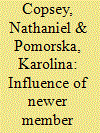

|
|
|
|
|
| Publication |
2014.
|
| Summary/Abstract |
This article seeks to examine and assess the role of Poland in the early stages of the making of the Eastern Partnership of the European Union. First, it briefly reviews Poland's aims and ambitions with regard to the European Union's policy towards its eastern neighbours, both before and since it joined the European Union in 2004. Second, it describes and analyses the Eastern Partnership, including its added value for the European Neighbourhood Policy. Third, it draws on a range of interviews carried out by the authors in Brussels and Warsaw on Poland's role in the initial formation of the Eastern Partnership, as seen by its partners in the other member states and European institutions. In addition, it seeks to unpack some of the early stage lessons learnt by the Polish government about how best to achieve its ambitions in the European Union, and notes the remaining weaknesses of the Polish administration, particularly in the area of administrative capacity.
|
|
|
|
|
|
|
|
|
|
|
|
|
|
|
|
| 19 |
ID:
132330
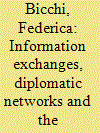

|
|
|
|
|
| Publication |
2014.
|
| Summary/Abstract |
This article analyses how, within the European Union foreign policy system, information is gathered and knowledge is constructed. The analysis is based on the evidence provided by a unique dataset, comprising the Heads of Mission reports between 1998 and 2010 and the EU member states' diplomatic networks. After distinguishing between information and knowledge, the article tackles three related aspects. First, it shows that the EU is able not only to favour information exchanges, but also to gather information and construct knowledge. Second, it argues that, while member states have an interest in contributing their own information and knowledge, European knowledge is also possible. This is demonstrated by means of an in-depth analysis of the preparation of the Heads of Mission report on East Jerusalem. Third, the article suggests that, depending on the reach of their diplomatic network, some member states are interested more than others in European information, but all member states are interested in European knowledge and in each other's interpretation of current affairs
|
|
|
|
|
|
|
|
|
|
|
|
|
|
|
|
| 20 |
ID:
131384
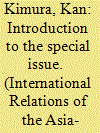

|
|
|
|
|
| Publication |
2014.
|
| Summary/Abstract |
In recent years, East Asian countries have faced serious challenges with regard to regional security. The bilateral relationships between China and Japan, and Japan and South Korea, have become increasingly strained due to a variety of disagreements over key political issues, such as territorial claims. Some observers argue that China and Japan may become involved in a direct military confrontation in the near future over the Senkaku/Diaoyu Islands. The increasing levels of naval and aerial engagements between the two countries demonstrate that such arguments can no longer be seen as 'out of the question'. While two democracies in the region, Japan and South Korea, are both major alliance partners with the United States and share the key security concern of countering North Korea's nuclear and conventional provocations, the two have suffered deteriorating relations since 2012. For instance, the General Security of Military Information Agreement, which provided a mechanism through which Japan and South Korea could share military technology, was canceled in July 2012. Furthermore, the two states have been embroiled in an increasingly antagonistic territorial dispute over Takeshima/Dokdo Islands since President Lee Myung-bak's visit to the islands in August 2012.
|
|
|
|
|
|
|
|
|
|
|
|
|
|
|
|
|
|
|
|
|